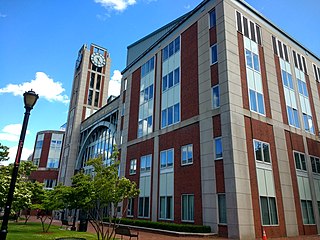External links
Located in: Memphis, Tennessee | |
| Academics | |
| Athletics | |
| Journals | |
| Life | |
| |
| Discipline | American law |
|---|---|
| Language | English |
| Publication details | |
Former name(s) | Memphis State University Law Commentary; Memphis State University Law Review |
| History | 1968–present |
| Frequency | Quarterly |
| Standard abbreviations | |
| Bluebook | U. Mem. L. Rev. |
| ISO 4 | Univ. Memphis Law Rev. |
The University of Memphis Law Review is a student-run legal journal. It is the only academic journal of the Cecil C. Humphreys School of Law.
A predecessor of the review, entitled Memphis State University Law Commentary, began publishing in a topically arranged loose-leaf format in post binders in 1968. Its first editor-in-chief was Charles H. Johnston. It was not until 1970 that this publication was reformatted as a regular journal, entitled Memphis State University Law Review. In 1994, the review officially became known as the University of Memphis Law Review.
In 1993, the National Conference of Law Reviews, an organization of approximately 200 law reviews and journals, selected the University of Memphis Law Review as its first national headquarters, and the review held that position until 2003.
The review publishes four issues per year and is staffed by approximately sixty students. From the third-year members, an editorial board is selected, typically in early spring, which manages the review.

Yale Law School (YLS) is the law school of Yale University, a private research university in New Haven, Connecticut. It was established in 1824 and has been ranked as the best law school in the United States by U.S. News & World Report every year between 1990 and 2022. One of the most selective academic institutions in the world, the 2020–21 acceptance rate was 4%, the lowest of any law school in the United States. Its yield rate of 87% is also consistently the highest of any law school in the United States.

Rhodes College is a private liberal arts college in Memphis, Tennessee. Historically affiliated with the Presbyterian Church (USA), it is a member of the Associated Colleges of the South and is accredited by the Southern Association of Colleges and Schools. Rhodes enrolls about 2,000 students, and its Collegiate Gothic campus sits on a 123-acre wooded site in Memphis' historic Midtown neighborhood.

The Harvard Law Review is a law review published by an independent student group at Harvard Law School. According to the Journal Citation Reports, the Harvard Law Review's 2015 impact factor of 4.979 placed the journal first out of 143 journals in the category "Law". It is published monthly from November through June, with the November issue dedicated to covering the previous year's term of the Supreme Court of the United States. The journal also publishes the online-only Harvard Law Review Forum, a rolling journal of scholarly responses to the main journal's content. The law review is one of three honors societies at the law school, along with the Harvard Legal Aid Bureau and the Board of Student Advisors. Students who are selected for more than one of these three organizations may only join one.

The University of Memphis (UofM) is a public research university in Memphis, Tennessee. Founded in 1912, the university has an enrollment of more than 22,000 students.

The University of Michigan Law School is the law school of the University of Michigan, a public research university in Ann Arbor, Michigan. Founded in 1859, the school offers Master of Laws (LLM), Master of Comparative Law (MCL), Juris Doctor (JD), and Doctor of the Science of Law (SJD) degree programs.

The University of Memphis Cecil C. Humphreys School of Law is an American Bar Association accredited law school and is the only law school in Memphis, Tennessee. The school has been associated with the University of Memphis since the law school's formation in 1962. The school was named in honor of former University president Cecil C. Humphreys. It is also referred to as U of M Law, Memphis Law, or Memphis Law School.
The University of Florida Fredric G. Levin College of Law is the law school of the University of Florida located in Gainesville, Florida. Founded in 1909, it is the oldest operating public law school in Florida, and second oldest overall in the state.

The Willamette University College of Law is the law school of Willamette University. Located in Salem, Oregon, and founded in 1883, Willamette is the oldest law school in the Pacific Northwest. It has approximately 24 full-time law professors and enrolls about 300 students, with about 100 of those enrolled in their first year of law school. The campus is located across the street from the Oregon State Capitol and the Oregon Supreme Court Building; the College is located in the Truman Wesley Collins Legal Center.

The New York University Law Review is a bimonthly general law review covering legal scholarship in all areas, including legal theory and policy, environmental law, legal history, and international law. The journal was established in 1924 as a collaborative effort between law students and members of the local bar. Its first editor-in-chief was Paul D. Kaufman. Between 1924 and 1950, it was variously known as the Annual Review of the Law School of New York University, the New York University Law Quarterly Review, and the New York University Law Review, before obtaining its current name in 1950.
The Duke Law Journal is a student-run law review and the premier legal periodical of Duke University School of Law. The journal publishes general-interest articles and student notes in eight issues each year.
A law review or law journal is a scholarly journal or publication that focuses on legal issues. A law review is a type of legal periodical. Law reviews are a source of research, imbedded with analyzed and referenced legal topics; they also provide a scholarly analysis of emerging law concepts from various topics. Law reviews are generated in almost all law bodies/institutions worldwide. However, in recent years, some have claimed that the traditional influence of law reviews is declining.
The Penn State Law Review is a law review and the flagship legal publication of Penn State Law. Its origins trace back to 1897 as The Forum, later renamed the Dickinson Law Review while affiliated with the Dickinson Law School, making it one of the oldest legal periodicals in the United States. When the Dickinson Law School merged with Penn State University in 2003, the name of the periodical was changed to the Penn State Law Review. Following the separation of the Penn State Law and Penn State Dickinson Law campuses into separately-accredited law schools in 2016, each school maintained separate law reviews; the name Dickinson Law Review was readopted by its respective law school, while the name Penn State Law Review was retained by Penn State Law.

The University of Missouri School of Law is the law school of the University of Missouri. It is located on the university's main campus in Columbia, forty minutes from the Missouri State Capitol in Jefferson City. The school was founded in 1872 by the Curators of the University of Missouri. Its alumni include governors, legislators, judges, attorneys general, and law professors across the country. According to Mizzou Law's 2016 ABA-required disclosures, 82 percent of the 2016 class obtained full-time, long-term, JD-required employment nine months after graduation.

The Rutgers Law Review was a quarterly, scholarly journal focusing on legal issues, published by an organization of second- and third-year law students at the former Rutgers School of Law–Newark, in Newark, New Jersey. It was the flagship law review among the five accredited law journals at Rutgers School of Law–Newark. Among its notable alumni are Ronald Chen, acting dean of the law school and former public advocate for the State of New Jersey, and Senator Elizabeth Warren, former professor of law at Harvard Law School and chair of the Congressional Oversight Panel created to oversee the U.S. banking bailout, formally known as the Troubled Assets Relief Program.

Rutgers Law School is the law school of Rutgers University, with classrooms in Newark and Camden, New Jersey. It is the largest public law school and the 10th largest law school, overall, in the United States. Each class in the three-year J.D. program enrolls approximately 350 law students. Although Rutgers University dates from 1766, its law school was founded in Newark in 1908. Today, Rutgers offers the J.D. and a foreign-lawyer J.D., as well as joint-degree programs that combine a J.D. with a graduate degree from another Rutgers graduate program. Rutgers has law alumni who practice in every U.S. state and in foreign jurisdictions throughout the world. Current well-known alumni include U.S. Senators Elizabeth Warren (MA) and Robert Menendez (NJ) and three of seven sitting justices on the New Jersey Supreme Court. The late United States Supreme Court Justice Ruth Bader Ginsburg was a member of the Rutgers law faculty early in her career. Rutgers serves a unique role in New Jersey's legal landscape: the current Constitution of New Jersey was adopted in 1947 pursuant to a convention at Rutgers University, and the Rutgers Law Library serves as a repository of New Jersey's key legal documents from the colonial era through current legislation and case law.
The Catholic University Law Review is a student-run quarterly law review published by the Columbus School of Law.
The Iowa Law Review is a law review published five times annually by the University of Iowa College of Law. It was established in 1915 as the Iowa Law Bulletin. It is ranked 11th among 1550 journals indexed in the W&L ranking. The journal has been student-edited since 1935.
The Rutgers Law Journal was a quarterly, student-run law review published at the former Rutgers School of Law–Camden, in Camden, New Jersey. It was the flagship law review among the three accredited law journals at Rutgers School of Law–Camden.

The Fordham Law Review is a student-run law journal associated with the Fordham University School of Law that covers a wide range of legal scholarship.
African Americans are the second largest census "race" category in the state of Tennessee after whites, making up 17% of the state's population in 2010. African Americans arrived in the region prior to statehood. They lived both as slaves and as free citizens with restricted rights up to the Civil War.